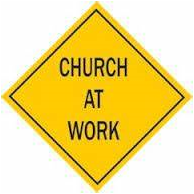
How the Church May Use Its Money
Andy Sochor
 “Now concerning the collection for the saints, as I directed the churches of Galatia, so do you also. On the first day of every week each one of you is to put aside and save, as he may prosper, so that no collections be made when I come” (I Corinthians 16:1-2).
“Now concerning the collection for the saints, as I directed the churches of Galatia, so do you also. On the first day of every week each one of you is to put aside and save, as he may prosper, so that no collections be made when I come” (I Corinthians 16:1-2).
The passage above shows the practice of churches in the first century under the direction of the apostles taking up a collection on the first day of the week. Brethren often cite this as the reason why Christians today continue to give on the first day of each week when they assemble with their local congregations.
But why do we give on the first day of each week? Besides following this example, what is the purpose of doing this? After we put our money in the collection plate, what does the church do with it? Are there any instructions or principles in the New Testament that would inform us about the church’s use of that money? We are going to consider these questions in this article.
The Concept of a “Church Treasury”
Before discussing how the church may use its money, we need to address a question that sometimes arises regarding the church treasury. Some Christians argue that a church treasury should not exist because it is not mentioned in the New Testament. We certainly want to be careful not to implement anything in the Lord’s church that is without Scriptural authority (Colossians 3:17). However, when it comes to a “church treasury,” even though the term is not used in the New Testament, the concept certainly is.
In the first century, churches had a way to collect money from their members (Acts 4:34-35; I Corinthians 16:1-2). In the passage cited above, Paul indicated that money collected from members would be saved until it was used so that “no [special] collections” would have to be made when the time came for money to be used for a specific purpose. It is this practice – the collecting and saving of money by the church to be used later – that we are considering today, regardless of what term brethren use to refer to it. However, for this article, we will call this collection of money the “treasury.”
Philosophies Regarding the Use of the Treasury
There are three basic ideas about how a church may use the money it collects:
- It may be used in any way the church decides to use it – This cannot be true since we are to do all things by the authority of Christ (Colossians 3:17).
- It may be used any way that an individual Christian is authorized to use his money – This also cannot be true because there are some good works that churches “must not be burdened” with and be left to individual Christians to do instead (I Timothy 5:16).
- It may be used only in the ways authorized for churches in the New Testament – This is what we are left with. We will see what this means as we go through this article.
The Works of the Church
In order to determine how the church may use its money, we have to know what a local congregation can do. As noted above, this will be more limited than what we, as individual Christians, may be authorized to do.
- Evangelism– “But in case I am delayed, I write so that you will know how one ought to conduct himself in the household of God, which is the church of the living God, the pillar and support of the truth” (1 Timothy 3:15). Besides the regular evangelism efforts that all Christians are to do (1 Peter 3:15), this could involve supporting preachers who work in a local church (Acts 11:25-26), sending men out to preach in other places (Acts 13:1-3; cf. Romans 10:15), and supporting preachers who are already working in another location (II Corinthians 11:8; Philippians 4:15-16).
- Edification– “From whom the whole body, being fitted and held together by what every joint supplies, according to the proper working of each individual part, causes the growth of the body for the building up of itself in love” (Ephesians 4:16). This is the work of strengthening those who are already in the body of Christ. This can be done by “leaders” in the church teaching and equipping the brethren in that place (Ephesians 4:11-12), and also by all members encouraging one another (Hebrews 3:12-13; 10:24-25).
- Benevolence– “For there was not a needy person among them, for all who were owners of land or houses would sell them and bring the proceeds of the sales and lay them at the apostles’ feet, and they would be distributed to each as any had need” (Acts 4:34-35). In every example of benevolence by the church in the New Testament, the recipients were always Christians (Acts 4:32; 11:29; Romans 15:26; I Corinthians 16:1; II Corinthians 8:4). Not only this but instead of being an ongoing work of the church, benevolence was carried out by the church only under exceptional circumstances (Acts 11:28-29) and was meant to be temporary (II Corinthians 8:14).
- Worship– “They were continually devoting themselves to the apostles’ teaching and to fellowship, to the breaking of bread and to prayer. […] Day by day continuing with one mind in the temple…praising God” (Acts 2:42, 46-47). Often when we think of the “work of the church,” we talk about the first three points; yet gathering for worship was certainly something that the church assembled regularly to do (Acts 2:42; 20:7; Hebrews 10:25). They would observe the Lord’s Supper and give on the first day of the week (Acts 20:7; I Corinthians 16:1-2). Other gatherings could also include singing (Colossians 3:16), praying (Acts 2:42), and preaching or teaching (Acts 11:26).
These are the works that the Lord has given His church to do. Therefore, any funds collected by the church on the first day of the week – the only time given in the New Testament for churches to take up a collection to fund its work (I Corinthians 16:1-2) – may be used to support these works.
Many Christians want to include various types of social work in addition to the works listed above, such as meals, activities, entertainment, and more. These may be good for individuals or households to do, but they are not the church’s work. As Paul explained to the church in Corinth, they had “houses in which to eat and drink” (I Corinthians 11:22). Except for the Lord’s Supper, which was to be done when they assembled, they were to “eat at home” (I Corinthians 11:34). It is good for Christians to be “taking their meals together” (Acts 2:46), but this is something they do as individuals and households; it is not the work of the church to provide for such things.
Treasury Used Autonomously
The Lord designed local churches to be autonomous (self-governing and independent). This is clearly seen in the role of elders who were to “shepherd the flock of God among [them], exercising oversight” (I Peter 5:2). Nowhere in the New Testament were they authorized to exercise oversight beyond the local congregation where they were. As local churches were to function autonomously, they were naturally to use the funds collected to do their own work.
This meant they were not to send money to an organization to take over the work the Lord gave them to do. Since churches are to preach the gospel as “the pillar and support of the truth” (I Timothy 3:15), they are not to send their money to a missionary society to do that work for them. They could support individual preachers directly in other places (II Corinthians 11:8; Philippians 4:15-16) but not send money to a human institution that would assume the oversight of sending and supporting gospel preachers.
This also meant they would not send money to another congregation to fund its work. As elders were to exercise oversight over the flock among them (I Peter 5:2), they were responsible for the work being done by that congregation. They did not pass off their responsibility by sending money or resources to a “sponsoring church” to engage in whatever work the receiving church had chosen to do.
Conclusion
It is a privilege to financially support the Lord’s work. It is also an obligation we have as part of a local church. However, the congregation collecting those funds is not free to use them however they wish. That money is, in essence, “the Lord’s money.” We need to recognize the work that He has given His church to do, then use the treasury to support that work in authorized, expedient, and wise ways as we strive to be faithful stewards of what belongs to Him.
__________
What One Tolerates, the Next Accepts
Mark White
 John Wesley once wrote, “What one generation tolerates, the next generation will embrace.” Both sacred and secular history have proven the truth of this assessment time and time again.
John Wesley once wrote, “What one generation tolerates, the next generation will embrace.” Both sacred and secular history have proven the truth of this assessment time and time again.
Everything from dancing to drinking, from abortion to mercy-killing, has gone from toleration to acceptance. In the home and in the church, everything from immodesty to immorality has been first allowed and then endorsed. Adulterous marriages, gambling, and other similar sins, have gone from being permitted to being sponsored. Remember when wearing shorts and attending dances were generally condemned as sinful? Now, in some places, shorts are being worn to church services, and dances are sometimes held in church buildings! Truly, “what one generation tolerates, the next generation will embrace.”
- One generation tolerated sprinkling for baptism if a person were seriously ill. The next generation accepted sprinkling for baptism as an option for everyone.
- One generation approved a “head” elder. The next generation appointed some elders “bishops.”
- One generation introduced instruments of music as an aid to poor singing. The next generation demanded we worship with instruments.
- One generation accepted the “fellowship hall” (which, at first, was just a few tables in the basement for social meals). The next generation built gymnasiums and “Family Life Centers.”
- One generation apologized for “hard preachers” who opposed denominationalism. The next generation saw their sons and daughters joining those denominations.
- One generation spoke of the need to reach out in a “non-judgmental” way to our Catholic and Protestant friends. The next generation welcomed Presbyterians into “our fellowship” with only a handshake.
- One generation spoke of congregational singing as “one of our traditions.” The next generation defended choruses and choirs.
- One generation applauded preachers who closed their sermons without an appeal for sinners to be baptized for the remission of sins. The next generation denied the gospel plan of salvation in general and baptism in particular.
What does this say to us? What is our responsibility? “You shall observe to do therefore as the Lord… hath commanded you: ye shall not turn aside to the right hand or to the left” (Deut. 5:32). “Hold fast the form of sound words” (2 Tim. 1:13). “Continue thou in the things which thou hast learned and hast been assured of, knowing of whom thou hast learned them” (2 Tim. 3:14). “Mark them which cause divisions and offenses contrary to the doctrine which ye have learned; and avoid them” (Rom. 16:17).
The next time we are tempted to deviate from the word of God, let us remember that what we tolerate, our children will embrace.
__________
God’s View of the Death of the Righteous
Mike Johnson
 Dealing with the death of a loved one can be one of the greatest agonies a person has to face. We think of the death of a loved one in terms of heartache, tears, sorrow, and pain. Yet, Psalm 116:15 says, “Precious in the sight of the Lord is the death of his saints.” So let us consider how the death of one of God’s saints is “precious” in His sight.
Dealing with the death of a loved one can be one of the greatest agonies a person has to face. We think of the death of a loved one in terms of heartache, tears, sorrow, and pain. Yet, Psalm 116:15 says, “Precious in the sight of the Lord is the death of his saints.” So let us consider how the death of one of God’s saints is “precious” in His sight.
Whereas the death of a loved one causes us to have sorrow and pain, God has a different perspective. To begin with, it is clear that God is delighted when a person becomes a Christian. Indeed, there is rejoicing in heaven. We can also say He is delighted when He sees the new Christian progressing from a newborn babe in Christ to a mature Christian. (Parents, for example, rejoice when their children achieve specific goals, such as earning their high school diploma.) Likewise, God is pleased when we reach the end of our lives as faithful servants. When we die, we go home to God. According to Philippians 1:23, Paul contemplated death near the end of his life and stated that he had a “desire to be with Christ; which is far better”(Note also 2 Cor. 5:6-8). Those who die in Christ are going home to their heavenly Father.
We may refer to death as a “departure,” and in a certain sense, it is. Once, a tribe in Africa referred to death not as a departure but as an arrival. They were looking at death from heaven’s standpoint.
Losing a loved one is very difficult. But, if we can look at their death as God does — as precious and as an “arrival” — then perhaps we can be comforted when our friends and family die who are faithful Christians. Of course, we will probably still feel “sorrow upon sorrow” (Phil. 2:27), but we should still look at the death of “saints” as God does. Their death is “precious” to the Lord.
__________
A Pioneer Preacher Proves a Point
About Infant Baptism
Greg Gwin
 Many stories are told about pioneer preacher “Raccoon” John Smith. He was a man of strong conviction and clever wit. One of the better known incidents in his preaching work is related in this excerpt from a biographical sketch …
Many stories are told about pioneer preacher “Raccoon” John Smith. He was a man of strong conviction and clever wit. One of the better known incidents in his preaching work is related in this excerpt from a biographical sketch …
Noticing, one day, that a young Methodist preacher had sprinkled a howling infant, he afterward seized him by the arm, in full view of the Methodist gathering that was meeting on the banks of Slate Creek, and powerfully pulled him toward the water. When the man questioned John of his intentions, Smith informed him that he was going to be baptized. The Methodist protested that he had no desire to be baptized. When the protest had been heard by the assembly, John stopped to make his point clear: why had the baby been “baptized” against his will and before belief? A few laughed in admiration of John’s witticism, but most were gravely touched by the seriousness of his argument.
While this account may bring a chuckle, it also teaches a vital point. Infant baptism is an erroneous practice brought on by a false doctrine.
- Infants do not need baptism, for they are sinless (Ezekiel 18:20; Matthew 18:3).
- Additionally, any baptism entered into without prior faith (Mark 16:16), repentance (Acts 2:38), and confession (Romans 10:10) is of no effect to the saving of the soul anyway.
The example of devoted men like John Smith encourages us to be ready to use every opportunity to teach and defend God’s truth.
__________
“Let Us Negotiate”
Don C. Bentley
 A hunter raised his rifle and took careful aim at a large bear. When about to pull the trigger, the bear spoke in a soft soothing voice, “Isn’t it better to talk than to shoot? What do you want? Let us negotiate the matter.
A hunter raised his rifle and took careful aim at a large bear. When about to pull the trigger, the bear spoke in a soft soothing voice, “Isn’t it better to talk than to shoot? What do you want? Let us negotiate the matter.
Lowering the rifle, the hunter replied, “I want a fur coat.
“Good said the bear, “That is a negotiable question. I only want a full stomach, so let us negotiate a compromise.”
They sat down to negotiate, and after a time, the bear walked away alone. The negotiations had been successful. The bear had a full stomach, and the hunter had his fur coat.
Satan says, “let us negotiate.” But there are some things that cannot be compromised. If we try to compromise with sin, we are deceiving ourselves and will fall into a trap that will destroy us.”
“Abstain from every form of evil.” (I Thess. 5:22)
__________________________________
Editor: Mike Johnson
www.seekingthingsabove.org
====================================================

